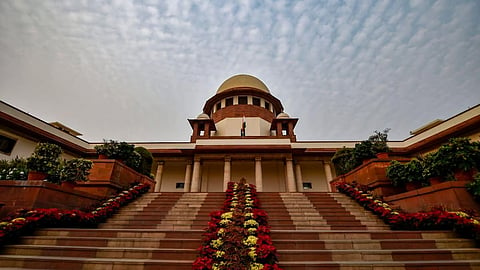SC review value of 'socialist', 'secular' in Preamble ruling on November 25
NEW DELHI: The Supreme Court on Friday reserved its verdict on a batch of pleas challenging the inclusion of the words “socialist” and “secular” in the Preamble to the Constitution.
During the hearing, the bench observed the 1976 amendment to the Constitution, adding terms “socialist”, “secular” and “integrity” to the Preamble, underwent judicial reviews and it cannot say whatever Parliament did during the emergency period was all nullity.
A bench comprising Chief Justice Sanjiv Khanna and Justice Sanjay Kumar reserved its verdict on the batch of pleas filed by former Rajya Sabha MP Subramanian Swamy, advocate Vishnu Shankar Jain and Advocate Ashwini Kumar Upadhyay, saying that it would pronounce its order on the issue on November 25.
The CJI said, “The subject amendment (42nd amendment) has been subjected to a lot of judicial reviews by this court. The Parliament has intervened. We cannot say that whatever Parliament did at that time (emergency) was all nullity.”
The bench also refused to refer the matter to a larger bench as sought by the petitioner and said “being socialist” in the Indian sense was understood to be a “welfare state”.
Advocate Jain said that in a recent verdict of a nine-judge Constitution bench, the majority view doubted the interpretation of the word “socialist” as propounded by former apex court judges Justices VR Krishna Iyer and O Chinnappa Reddy. Emergency in India was declared by the late PM Indira Gandhi from June 25, 1975 to March 21, 1977.
The bench said, “The way we understand socialism in India is very different from other countries. In our context, socialism primarily means a welfare state. That is all. It has never prevented the private sector, which is thriving well. We have all benefited from it.” Justice Khanna said the word socialism was used in different contexts worldwide and in India it meant the state was a welfare one and must stand for the welfare of the people and should provide equality of opportunities. He said the top court held “secularism” to be part of the basic structure of the Constitution in the 1994 SR Bommai case.
Another petitioner, Advocate Ashwini Upadhyay, said that he was not against the concepts of “socialism” and “secularism” but opposed to their insertion into the Preamble.
The bench said Article 368 granted Parliament the power to amend the Constitution and it extended to the Preamble as well. “Preamble is a part and parcel of the Constitution,” the court said, making it clear that it will not go into the arguments that the Lok Sabha in 1976 could not have amended the Constitution and that amending the Preamble was a constituent power, exercised only by the Constituent Assembly.
Also in top court
PM’s security lapse: Punjab plea rejected
Punjab government’s plea seeking a direction for procuring the statements of witnesses who have deposed before former apex court judge Indu Malhotra, to probe the security breach during Prime Minister Narendra Modi’s visit to the state in January 2022, was dismissed on Friday. It was told to hold an independent inquiry.
Guj reply sought on Asaram Bapu plea
The Supreme Court on Friday sought the Gujarat government’s reply after hearing an appeal filed by jailed self-styled godman Asaram Bapu, who had approached the top court seeking suspension of sentence and bail in rape case in Gujarat. He claimed he is a victim of conspiracies to seize his Ashram.

